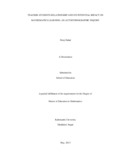
Please use this identifier to cite or link to this item:
https://hdl.handle.net/20.500.14301/364| Title: | Teacher-Students Relationship and its Potential Impact on Mathematics Learning: An Autoethnographic Inquiry |
| Authors: | Dahal, Niroj |
| Citation: | Dahal,N.(2013).Teacher-students relationship and its potential impact on mathematics learning: an autoethnographic inquiry |
| Issue Date: | May-2013 |
| Publisher: | Kathmandu University School of Education |
| School: | SOED |
| Department: | DOSE |
| Level: | Masters |
| Program: | Master of Education in Mathematics Education |
| Abstract: | This dissertation portrays my lived experience and is an exploration of my pedagogical practices as a learner, as a teacher and as a facilitator focusing on relationship between teacher and students shifting from traditional to transformative approach (e.g. meaning-centered and life-affirming) in teaching and learning. Based on my lived experiences as a learner from school to master level and as a teacher in different places in different times, I generated my research problems about the paradigm of teaching and learning in different stages with various kinds of relationship in mathematics learning and teaching. The aim of my research project was to examine and explore deep settled behavioral practices and seek to change myself and others towards transformative/constructivist approach of learning in terms of teacher-students relationship to maintain quality of education for future generation. In this study, I used interpretivism, criticalism, and post modernism research paradigms to embrace multi- paradigmatic research design. Interpretive research paradigm helped me to be subjective to address the emergent issues that emerged during the research process; critical paradigm enabled me to observe educational ii phenomenon critically thereby helping me to develop research problems from finger pointing to self and other, un/helpful dualism, envisioning and shifting process. Post modernism helped me to present through multiple genres of writing like poem, narrative, fiction, poster, letter, e-mail, text SMS, etc. to make my text wealthy, and pedagogically thoughtful about my experience regarding paradigm of learning and teaching. Staying myself within multi-paradigmatic research design space, I used auto ethnography as a fusion research methodology in my inquiry. Auto-ethnography helped me to place myself within my culture thereby enabling me to explore multilayered pictures of my educative practice of self and others. Auto-ethnographic inquiry also helped me to examine the pedagogical culture and context from different perspectives as students, teachers, and researcher thereby offering space for interpretation, transformation and envisioning. As a mathematics pedagogue, I investigated that traditional teacher-centered, transmission pedagogy, culture and content free mathematics curriculum and practices are some unhelpful dualisms to make our mathematics more meaningful which could only be achieved through better relationship with students, and student-centered pedagogy. I predicted that student’s active participation in learning, social and cultural enactment, and transformative pedagogy promote our practice to be more meaningful, and learner centered which in turn develops cordial relationship. My vision to develop cordial relationship between teacher-students is focused on curriculum a bit differently in this study. |
| URI: | https://hdl.handle.net/20.500.14301/364 |
| Appears in Collections: | Dissertation |
Files in This Item:
| File | Description | Size | Format | |
|---|---|---|---|---|
| TEACHER-STUDENTSRELATIONSHIPANDITSPOTENTIALIMPACTINMATHEMATICSLEARNING-NIROJDAHAL--M Ed in Mathematics.pdf | 1.26 MB | Adobe PDF |  View/Open |
Items in DSpace are protected by copyright, with all rights reserved, unless otherwise indicated.